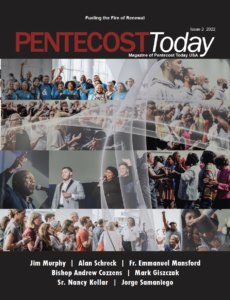4th Sunday in Ordinary Time
Meditation and Questions for Reflection or Group Discussion
Mass Readings:
1st Reading: Zephaniah 2:3; 3:12-13
2nd Reading: 1 Corinthians 1:26-31
Responsorial: Psalm 146:6-10
Gospel: Matthew 5:1-12
Rejoicing in the Lord’s Great Love and Faithfulness
Rejoice and be glad, for your reward will be great in heaven. (Matthew 5:12)
Jesus’ Sermon on the Mount has been referred to by some commentators as his “manifesto”—a set of observations about the way things are and the way they could be. But have you ever read a manifesto? Many are political and can sound almost funny. Eager to win popular support, candidates or leaders often exaggerate. They promise health, happiness, and prosperity too. Opponents are quick to point out that all this is impossible to guarantee—yet they make similar claims!
Of course, Jesus isn’t campaigning for our vote. We know that when he says that something “will” happen, it’s completely different from the exaggerated promises of politicians. So in the Beatitudes, he is saying, with certainty, “This is how it will be. Do you want to be a part of it?”
Take a minute to reread the Beatitudes now, and substitute the word “might” each time you see the word “will.” “They might be comforted. . . . They might inherit the land.” Not so inspiring, is it? Now read them as they are written. In these words, the almighty Son of God is assuring you beyond doubt that you, who are merciful, will receive mercy; that even though insults are hurled at you, you will have a great reward in heaven. Let that assurance deepen your faith in him.
We all know what it feels like when someone breaks their promise to us. In fact, we can become so accustomed to disappointment that we look skeptically at anyone who makes grand promises. That makes it hard for us to trust in Jesus’ words here.
Do it anyway! Remind yourself that God’s promises are true because he is trustworthy (Hebrews 11:11). Remind yourself that he loves you and wants nothing more than to lift you up into his presence. Today and every day, remind yourself that your faith and hope are in God, and he will never abandon you!
“Thank you, Jesus, that your kingdom will come. I place my hope in you.”
Download reflection with discussion questions here.
(Many thanks to The Word Among Us for allowing us to use meditations from their monthly devotional magazine. Used with permission. For more information on how to subscribe to their devotional magazine,
go to www.wau.org).
Sunday, January 29, 2017
Questions for Reflection/Discussion by Catholic Men:
- The first reading begins with these words: “Seek the LORD, all you humble of the earth, who have observed his law; seek justice, seek humility.”
- If you were to summarize your schedule for the upcoming week, would the above items be on it?
- If not, how can you make seeking the Lord, and seeking justice and humility, become a greater part of your week?
- The responsorial psalm expands the message from the first reading and also includes the Lord’s care for the poor and needy.
- In what way is the Lord’s great love and care for the poor and needy also a call to each of us to serve him in our service to others?
- How can you make this call more central in the ways you use your time?
- In the letter to the Corinthians, St. Paul seems to imply that God prefers the foolish, weak, lowly, despised, and those who count for nothing to accomplish his will. He also seems to imply that God has problems with the wise, powerful, strong, and those of noble birth.
- What do you think St. Paul really means by these words?
- How do they apply to us?
- The second reading ends with these words, “It is due to him that you are in Christ Jesus, who became for us wisdom from God, as well as righteousness, sanctification, and redemption, so that, as it is written, ‘Whoever boasts, should boast in the Lord’”.
- Why is it important to recognize, and be grateful to and thank, the Lord for what he has done in your life?
- What do you think is the meaning of the words; “Whoever boasts, should boast in the Lord”?
- The beatitudes in the Gospel reading are so familiar to us that we can easily pass over the radical nature of Jesus’ words and what is being asked of us. They describe, perhaps more than any other Scriptures, what it means to be a Christian, and be Christlike.
- In what ways are Jesus’ words in the beatitudes a radical way to describe what it means to be a Christian, and be Christlike?
- If the day were ever to come when the beatitudes were used to determine whether you were a Christian or not, would there be enough evidence to “convict” you? Why or why not?
- What can you do to increase the evidence?
- The meditation ends with these words regarding the promises Jesus made in the beatitudes: “We all know what it feels like when someone breaks their promise to us. In fact, we can become so accustomed to disappointment that we look skeptically at anyone who makes grand promises. That makes it hard for us to trust in Jesus’ words here. Do it anyway! Remind yourself that God’s promises are true because he is trustworthy (Hebrews 11:11). Remind yourself that he loves you and wants nothing more than to lift you up into his presence. Today and every day, remind yourself that your faith and hope are in God, and he will never abandon you!”
- Do you agree with these words, especially, that it is important to continually “remind yourself that your faith and hope are in God, and he will never abandon you”? Why or why not?
- Take some time now to pray and thank the Lord for his faithfulness to his promises and his great love for you. Use the prayer below from the end of the meditation as the starting point.
“Thank you, Jesus, that your kingdom will come. I place my hope in you.”
[The discussion questions were created by Maurice Blumberg, who is in partner relations for The Word Among Us Partners, (http://www.waupartners.org/); a ministry of The Word Among Us (www.wau.org) to the military, prisoners, women with crisis pregnancies or who have had abortions, and college students. He is also a member of the National Service Committee Council of the Catholic Charismatic Renewal (https://www.nsc-chariscenter.org/) and a member of the board of directors of the Christlife Catholic Ministry for Evangelization (https://christlife.org/). Maurice was also the founding Executive Director of the National Fellowship of Catholic Men, for which he is currently a Trustee (http://www.nfcmusa.org/). He can be contacted at (Enable Javascript to see the email address) mblumberg@wau.org.]


 Click Here for us to pray for your intentions through our new website.
Click Here for us to pray for your intentions through our new website. 
